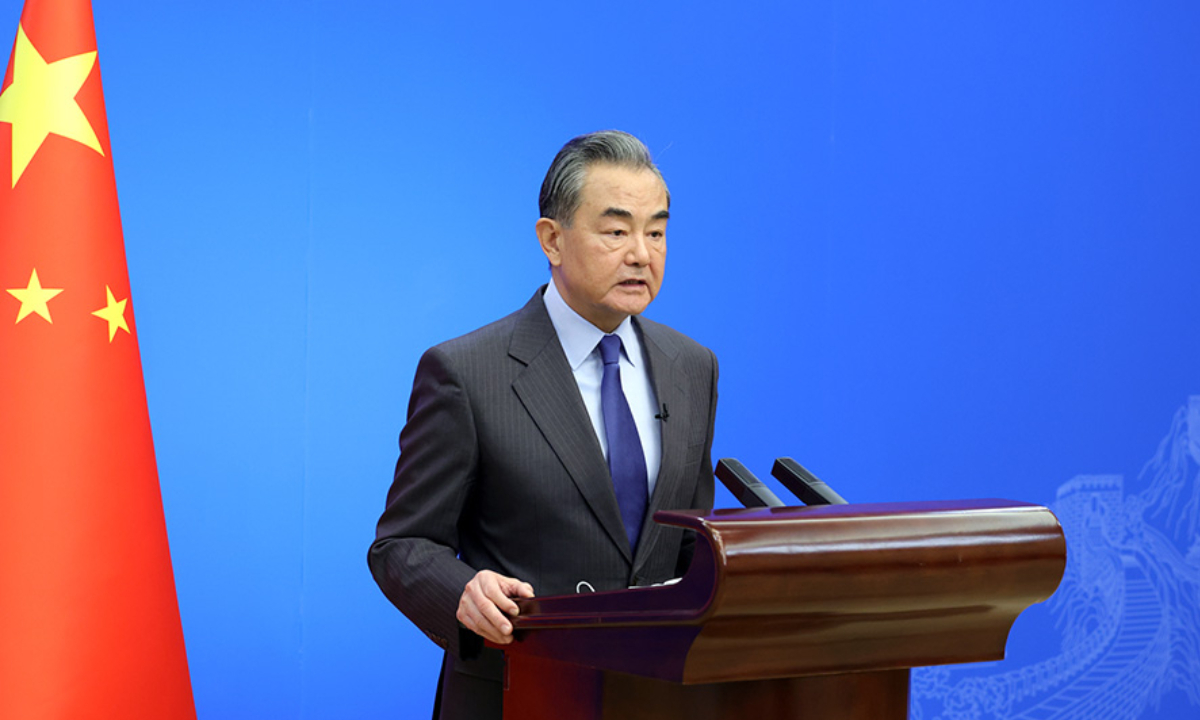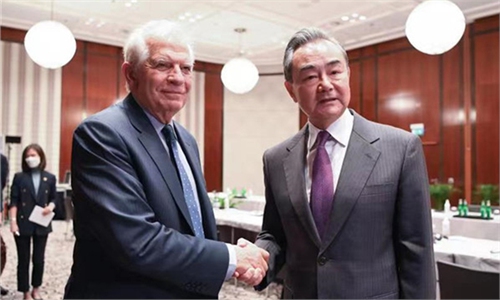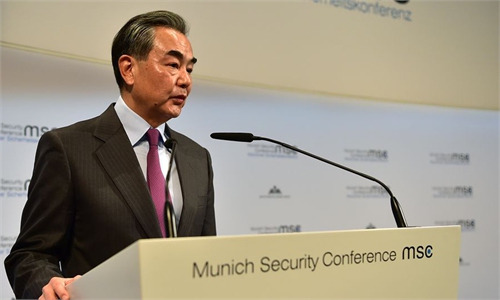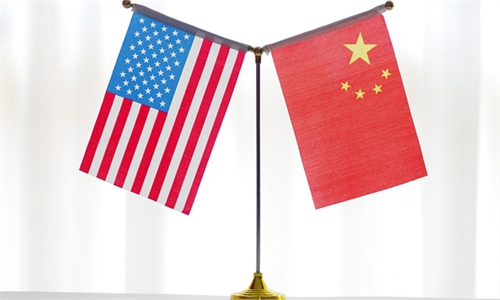Chinese top diplomat Wang Yi to pay a visit to Russia, promoting peace talk top on agenda
US hypes 'China military aid' to Russia highlights purposes of fanning flames: analysts said

Wang Yi at the symposium on the international situation and China's foreign relations on December 25, 2022. Photo: Ministry of Foreign Affairs
Chinese top diplomat Wang Yi is scheduled to visit Russia - the last stop of his tour to Europe since February 14. He is expected to promote peace talks as the Russia-Ukraine conflict approaches the one-year mark, with the situation still deteriorating. Analysts said that China's tangible moves in de-escalating the situation have been in stark contrast to the US' fanning of flames.Kremlin spokesperson Dmitry Peskov told reporters Monday that Russian President Vladimir Putin may hold talks with Wang Yi and he said the agenda for Wang is very "extensive and there is a lot to talk about."
Wang Yi, director of the Office of the Foreign Affairs Commission of the Communist Party of China (CPC) Central Committee and also a member of the Political Bureau of the CPC Central Committee, started his trip to Russia after visiting France, Italy, Hungary and his eye-catching engagement at the Munich Security Conference.
Wang's trip has attracted great attention as he is reportedly the highest-ranking Chinese official to visit Europe since the the conclusion of the 20th CPC National Congress, and also because his trip is taking place just days before the one-year anniversary of the outbreak of the Russia-Ukraine conflict when the international community is eager to seek a better solution to ease the tense situation.
Wang's trip to Russia, the latest interaction between China and Russia, will pave the way for further and higher-level communication as mutual political trust continue to deepen. The Russia-Ukraine conflict is also high on the agenda, analysts said.
China and Russia have maintained frequent high-level interactions in recent years from heads of state to diplomatic agencies. For example, on February 2 and 3, Chinese Vice Foreign Minister Ma Zhaoxu paid a visit to Russia and met with Russian Foreign Minister Sergei Lavrov.
The close relations between China and Russia have been advanced by their cooperation in various fields and close international coordination and their shared support to the international community in defending international fairness and justice, and resisting hegemony, Wang Chenxing, a research fellow from Institute of Russia, Eastern European and Central Asian Studies of the Chinese Academy of Social Sciences (CASS), told the Global Times on Monday.
However, the US and a handful Western countries are trying to tie up China and Russia especially in the Ukraine crisis for their own geopolitical strategic purposes, analysts said.
Stark contrast
One day after meeting with Wang Yi on Saturday at the Munich Security Conference, US Secretary of State Antony Blinken told media that China is considering giving Russia weapons and ammunition for the Ukraine war.
The top US diplomat did not elaborate on what information the US had received about China's potential plans, and said that it would be primarily weapons as well as ammunition, BBC reported.
The US invents these charges against China to drum strategic conspiracy of "China support to Russia," and by hyping "threats" from China and Russia, it can unify the West and further boost transatlantic allies, said Wang Chenxing.
Cui Heng, an assistant research fellow from the Center for Russian Studies of East China Normal University, told the Global Times that the US wants to tie China with Russia on its opposite side so that when Russia gains the upper hand on the battlefield with Ukraine, it can put the blame on China.
Blinken's remarks are also the US way to drawing up "red line" for China, warning it to shun providing military aid to Russia, Cui said. China has also repeatedly made it clear that its ties with Russia are not targeting any third party, and is not a military alliance.
Responding to Blinken's remarks, Chinese Foreign Ministry spokesperson Wang Wenbin said on Monday that the US is not qualified to give orders to China and it is the US that has been arming the battlefield. And China will never allow the US to boss it around or even exert pressure on China-Russia relations.
China's stance on the Ukraine crisis has always been clear and consistent - promoting peace talks. This is also the message sent by Wang Yi when meeting with Ukrainian foreign minister Dmytro Kuleba and will also be the stance when meeting with Russian leaders in Moscow, Wang Chenxing said.
Cui said that Wang's trip to Russia has conveyed a strong political signal about China's concerns for global security. "It provided China's solution to the tensions fueling security situation worldwide."
When delivering a speech at the Munich Security Conference on Saturday, Wang said that China will publish a document on its stance of finding a political settlement to the Ukraine crisis, which analysts said highlights China's active efforts in pursuing peace talks between Russia and Ukraine.
Analysts also criticized the US for continuing adding oil to the fire, which not only impede the international community's efforts in putting truce of the Russia-Ukraine conflict but also endanger the global stability.
The conflict has claimed many lives and caused higher losses. The US' irresponsible moves relating to the situation showed it doesn't really care if the crisis will be end in peace or not, and it is time for more countries to work to promote a change, said analysts.




